Event link-building is a strategy that involves participating in events, like conferences or concerts, sponsoring or hosting them to get backlinks.
From the article, you will learn how to leverage events to acquire high-quality backlinks and boost your brand visibility.
You will discover:
- Benefits of event link building
- Types of events you can leverage
- How to get the most out of events for link-building and not only
Key takeaways
- Event link building is a digital marketing strategy that leverages participation in, sponsorship of, or hosting of events to acquire valuable backlinks to your website.
- Event link building enhances domain authority, increases brand visibility, generates targeted traffic and leads, improves local SEO, and facilitates networking and relationship-building.
- When hosting your own event, create a compelling landing page, implement event schema, list it on third-party platforms, develop a content strategy to promote the event, leverage outreach and influencer marketing, and consider paid promotions.
- To build links through event sponsorship, identify suitable events, negotiate sponsorship packages for maximum link value, and create sponsorship-related content for additional link opportunities.
- Even when direct backlinks aren't on the table, you can leverage event participation for link building by repurposing presentations, engaging on social media, and building relationships with attendees and speakers.
- Need help leveraging events for link-building? Get in touch with Editorial.Link!
What Is Event Link Building?
As you suspect, event link-building is a digital marketing strategy that leverages events to build juicy links to your website.
What kinds of links are we talking about?
- Sponsor links;
- Speaker profile links;
- Calendar and agenda links;
- Press coverage links from media outlets;
- Related blog posts mentioning the event and your involvement.
There are 3 ways to get these links:
The first one is hosting your own event to attract links from the speakers’ and sponsors’ websites, media outlets covering the event, and bloggers or influencers in your niche.
Like the Ahrefs Evolve conference, whose landing page has been linked to 456 times.
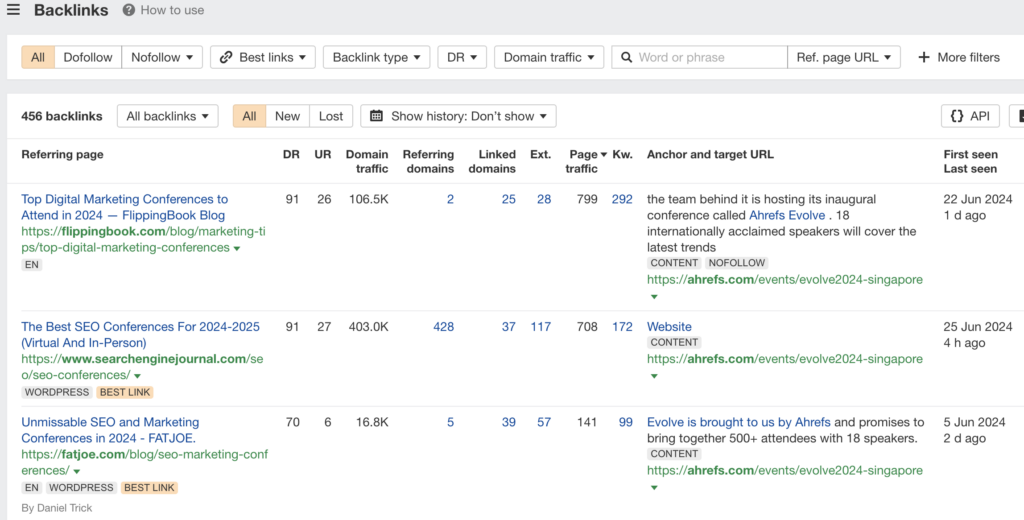
Sponsoring events is another way.
For example, if you’re in the SEO business, there are plenty of conferences that you could sponsor in every corner of the world, such as the SEO Mastery Summit in Saigon or BrightonSEO.
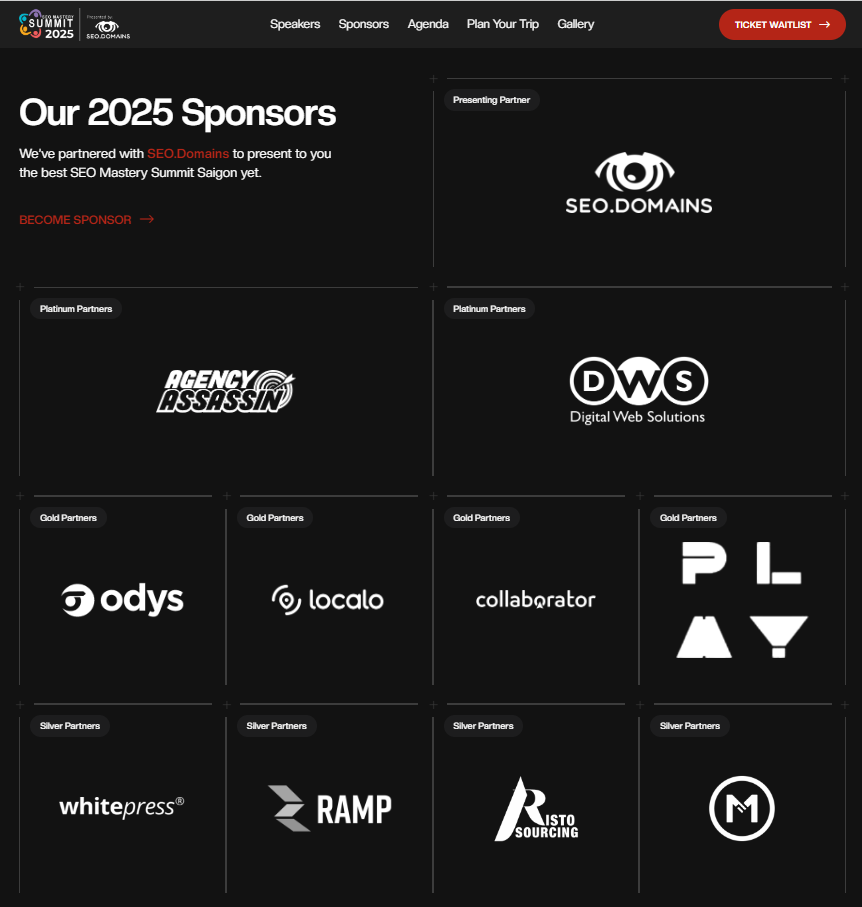
The final way is taking part in the event, for example, as a speaker. By doing so, you can get links in the content promoting the event, such as its agenda.
Main Benefits of Event Link Building
Event link building is attractive for a few reasons.
Boost Domain Authority
Event sites and news outlets covering them tend to have high Domain Authority/Rating. Links from such sites pass more link equity and consequently can boost your website’s authority.
Event link building helps you secure high-quality backlinks from authoritative sites, boosting your domain authority and search engine rankings.
Best part?
Such links are often difficult for your competitors to replicate. Hosting a conference or negotiating a sponsorship deal isn’t something you can do in the break between meetings.
Increased brand visibility and authority
Whether you host, sponsor, or speak at the event, your company name gets featured on conference websites, press releases, and social media posts related to the event.
This exposure puts your brand in front of a wider audience.
The result?
More people associate your brand with high-profile industry events, and your visibility and recognition grow. And it increases their trust.
One major benefit of event link-building is the credibility boost it offers. Sponsoring a reputable event instantly positions your brand as an industry leader.
Targeted traffic and lead generation
Event-related sources can drive referral traffic directly to your site.
These aren’t random visitors. They are genuinely interested in your niche or industry and are more likely to engage with your content. And potentially convert into customers.
Sponsoring events or even running your own major event like we are doing with Edge of Search SEO Conference exposes your brand to a targeted, engaged audience. This increases brand recognition and drives more referral traffic to your site.
Arguably, that’s probably the main benefit of getting involved in events, be it as an organizer, sponsor, or participant.
Because when you think about it, the resources that it requires could get you pretty much any link you want.
For example, Surfer probably got a few links by sponsoring the SEO conference in Chiang Mai last year, but the main benefit was that out of 800 participants, 400 left with a Surfer subscription.
Improved local SEO
For local businesses, participating in community events can significantly boost local SEO efforts. Local news coverage, community websites, and regional business directories can improve your visibility in local search results.
Networking and relationship-building
Live events are an excellent opportunity to form new collaborations, partnerships, and alliances.
Such relationships can get you more links in the future, for example, through guest posting opportunities, but their benefits extend far beyond that. Connecting with industry peers and influencers opens doors for future projects that drive business results.
Sponsoring events means you get to connect with other industry leaders, influencers, and media outlets. These connections can lead to more backlinks, media mentions, and collaboration opportunities beyond the event itself.
How to Build Links to Your Events
Let’s start with hosting your own event as a link-building strategy.
This is the most resource-intensive but guarantees the most links and allows you to shape how your company comes across.
Mind you, these don’t need to be humongous events with thousands of visitors. A webinar or a training session can bring links. But of course, the exposure won’t be the same.
Create an Event Landing Page
A well-designed landing page is essential for building links to your event.
What event details should it include?
- Event description
- Key highlights, like keynote speakers or workshops
- Unique event benefits
- The date and venue
- Profiles of speakers or renowned participants
- Event agenda or schedule
- The registration form
Make sure that the page is visually appealing and optimized for search to improve its discoverability. Include CTAs to drive registrations.
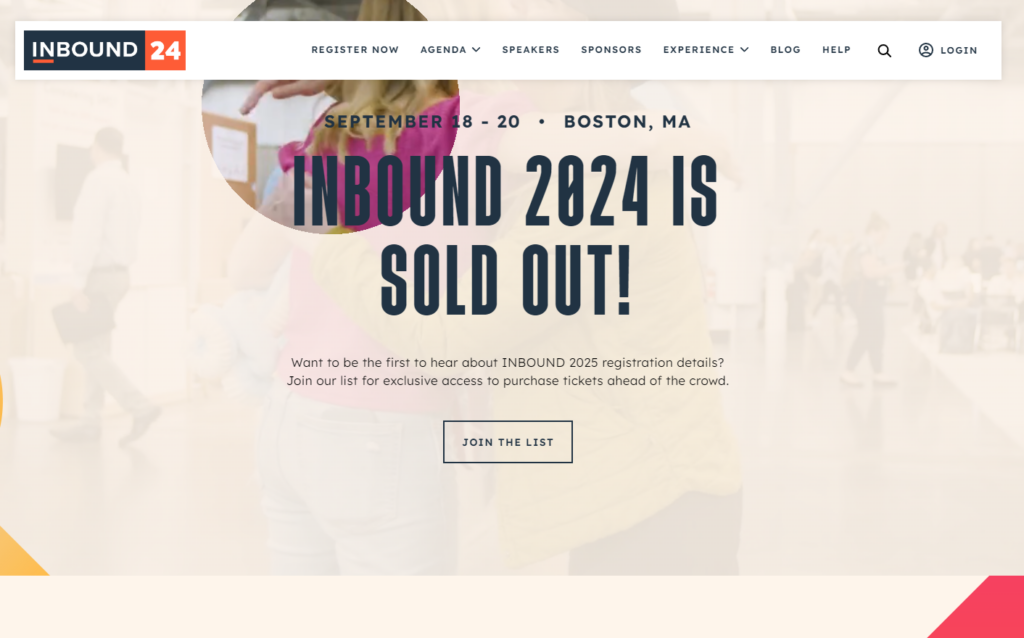
Implement event schema
Implementing event schema markup helps search engines understand the event details. More importantly, your event can feature in rich snippets in search results, boosting its visibility and CTR.
This should include details like the event dates, time, location, and ticket prices.
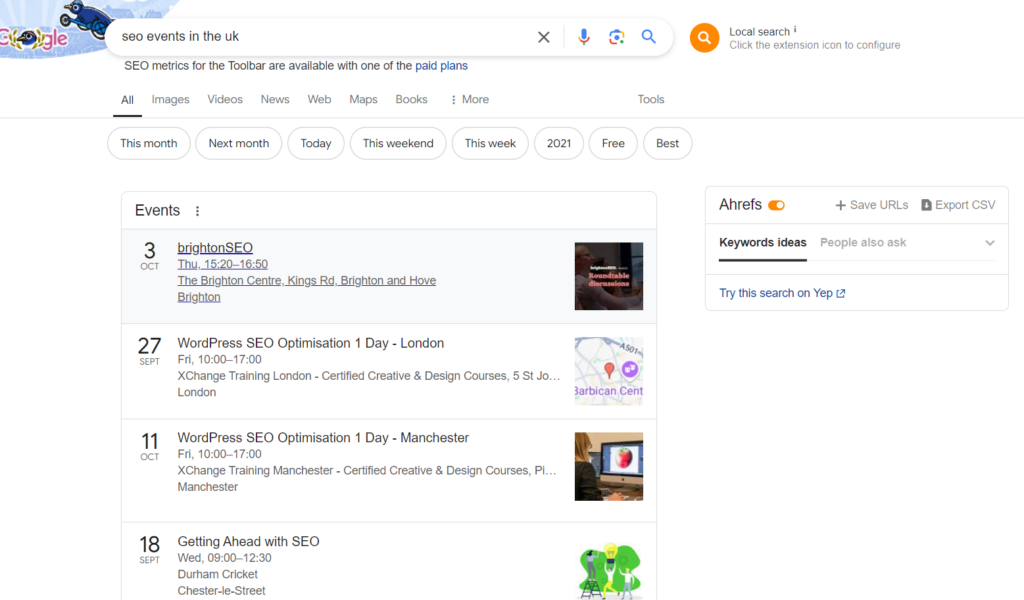
List the event on third-party platforms
Don’t rely on your website only to promote the event.
Increase its visibility by listing it on platforms like Eventbrite, MeetUp, Facebook, or LinkedIn.
This not only promotes the event to your target audience. It makes it easier for roundup or listicle writers to find your event, and you know what this means: link opportunities.
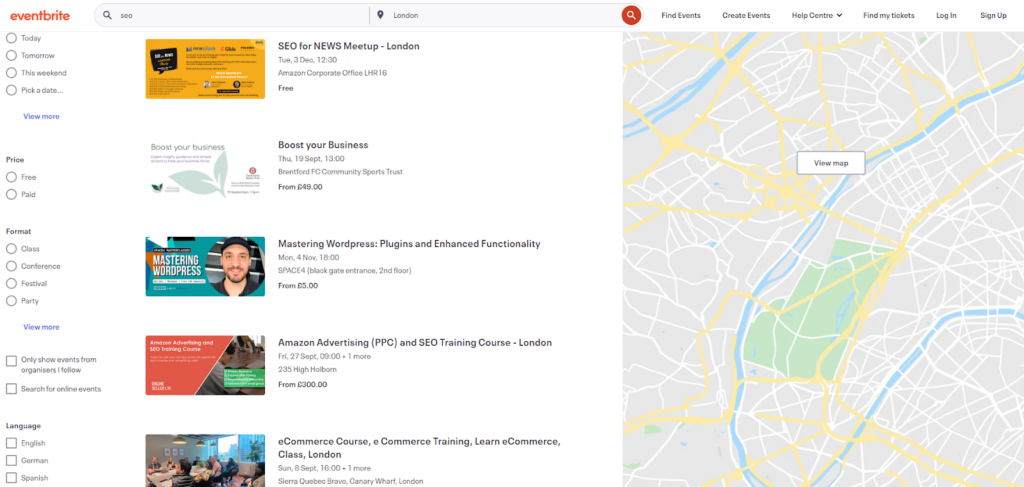
Develop a content strategy around your event
To gain more visibility, develop a content strategy around your event.
Use blog posts, videos, and infographics related to your event theme to promote it to potential attendees.
Encourage speakers or sponsors to do some footwork mentioning your event in their content as well. It’s in their interest for people to talk about it.
While organizing the event, and developing the communication strategy or asking your partners for actions, be sure to include specifically how and where you want them to link, in which way, and provide them the right collaterals to make their life easier.
Add a paragraph about the event, and link-placements they can easily copy-paste for their blogs, emails, social media, and anywhere else they will promote the event.
Leverage outreach and influencer marketing
Influential bloggers and celebrities in your industry can help you spread the word about the event and generate more coverage through their audiences.
How can you convince them to cover your events?
As always, offer unique value, such as exclusive content, interviews with speakers, or special access, to let them stand out from their peers.
Lean into paid promotion
Targeted ads on social media platforms, like LinkedIn or Facebook, are the least organic way to promote your event.
However, they allow you to target very specific audience segments for increased impact.
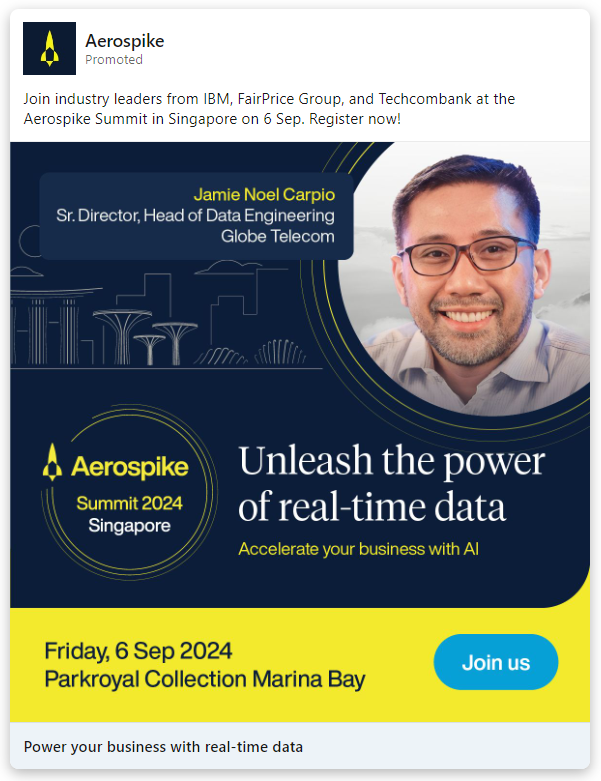
Sponsored content on industry news sites or blogs is another way to drive interest.
Yes, you’re right; they don’t give you backlinks, not dofollow ones anyway, but the increased exposure can translate into them indirectly.
How to Build Links Through Event Sponsorship
Sponsoring an event is the middle ground between organizing an event and participating in it.
If you don’t have the time, money, or manpower to organize an event but still want to get a spot in the spotlight (and those highly-coveted links), this could be the way to go.
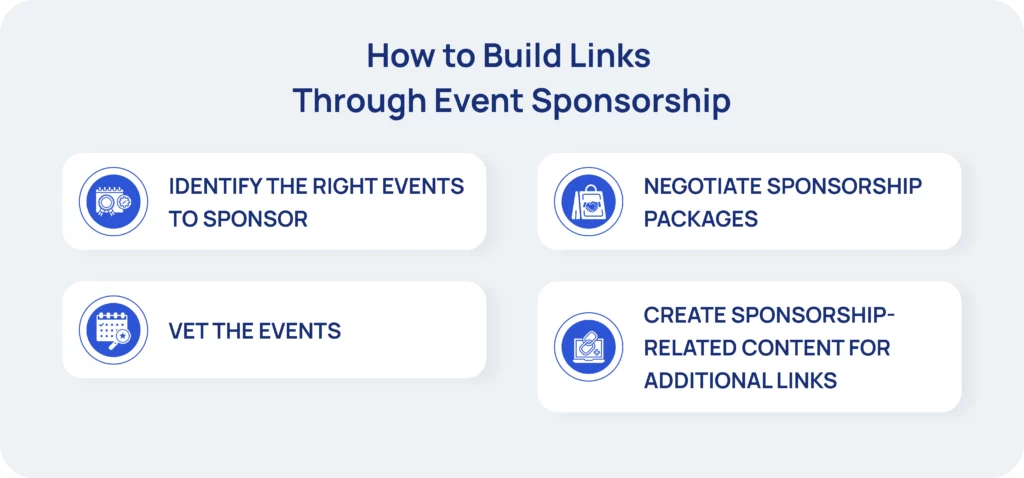
Identify the right events to sponsor
What kinds of events can you sponsor?
Here are a few ideas:
- Conferences
- Trade shows
- Seminars and workshops
- Academic events and lectures
- Associations or clubs
- Community events
- Hackathons and industry competitions
- Sporting and cultural events, like concerts
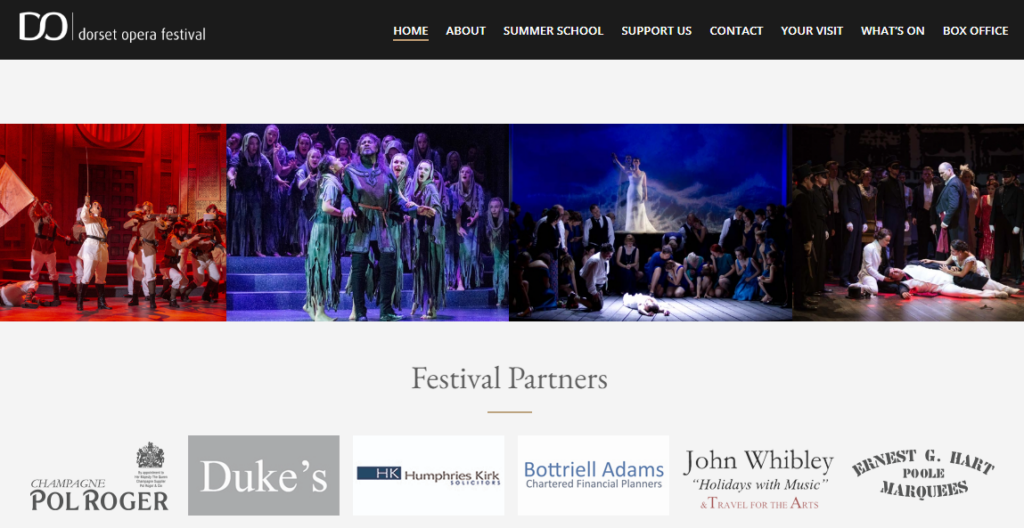
There are a few ways to find events that could be a good match.
Google search operators are one.
Run a search for a keyword related to your niche and ‘events’ and see what comes up. For example, (SEO and events) London
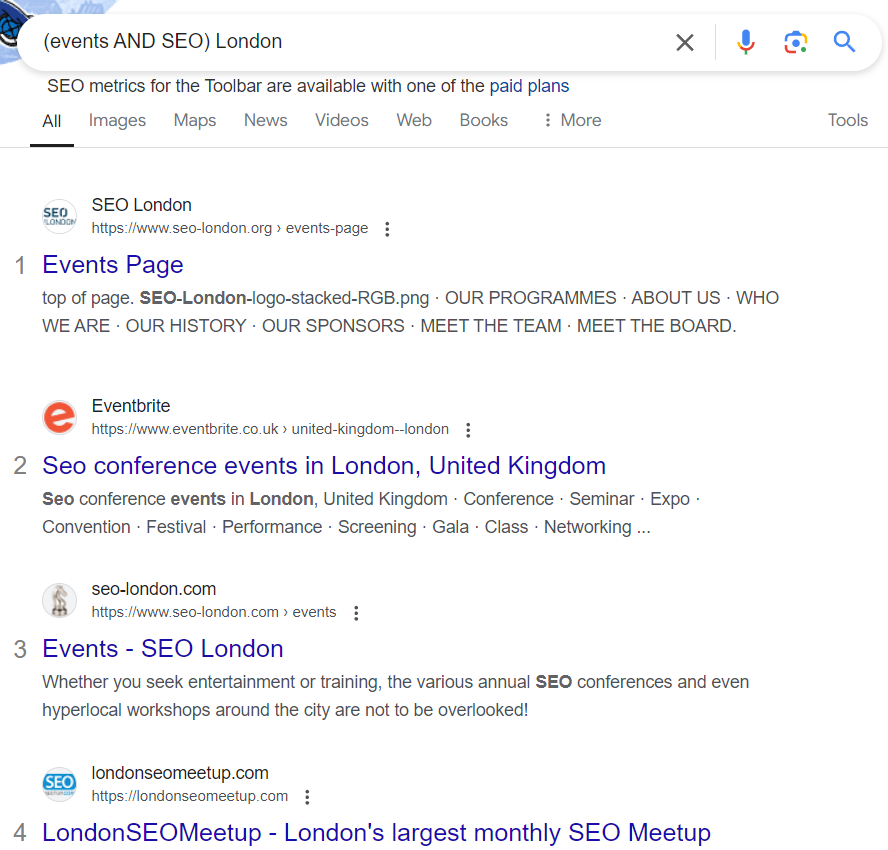
Another way is to look for listicles featuring events in your sector.
For example, if you’re in the SaaS product space, look for ‘best product management conferences.
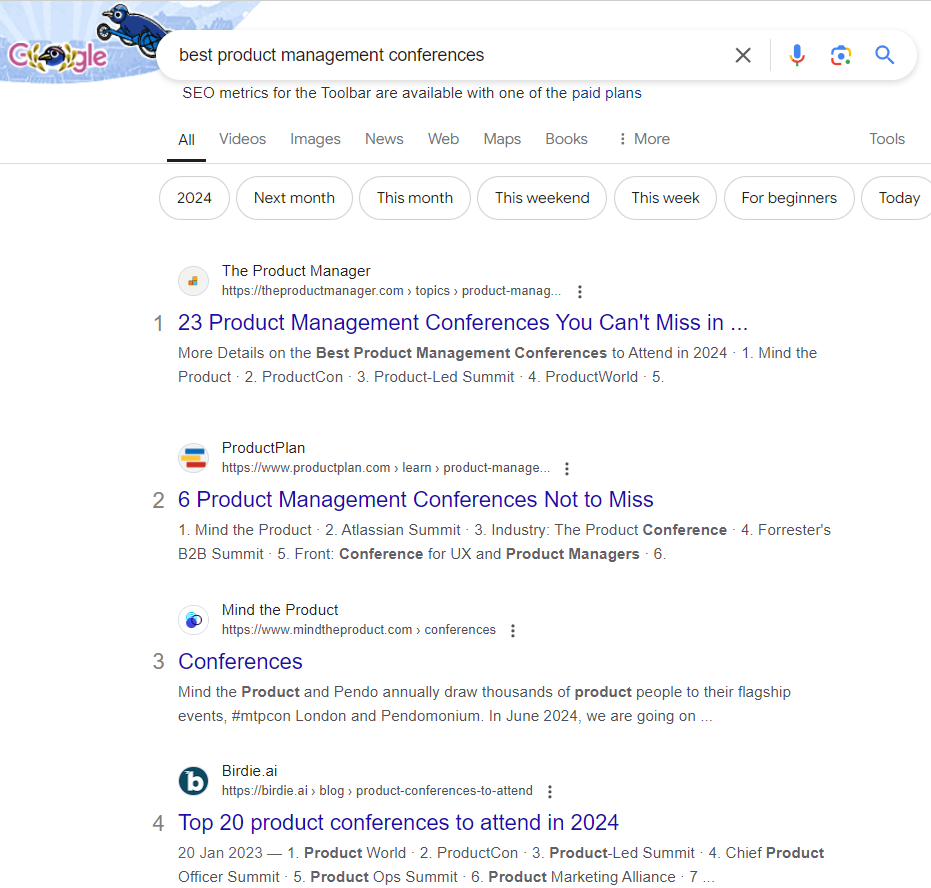
Finally, have you got an Ahrefs subscription?
Replicate the process in the Content Explorer to gain more insights about the event pages.
Change the search parameter to In Title, search for keyword +"conference," for example, product management +"conference."

This returns a list of potential events and website metrics like its DR and traffic.
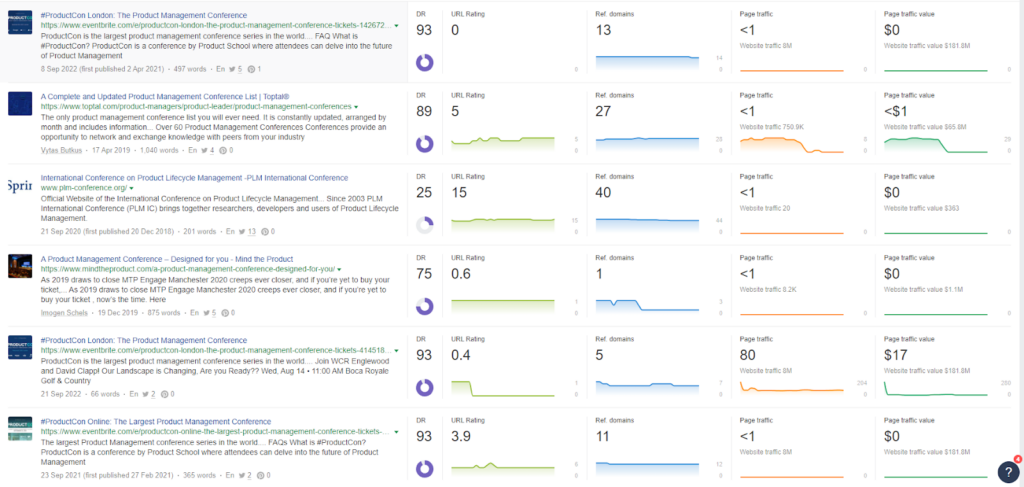
Let’s face it: some of the events that you find this way might be out of your league. Not many companies have the financial clout to sponsor BrightonSEO or ProductCon.
To find more realistic targets, filter the results by DR, say 30-60 or 30-70.
How else can you find other ‘tier-2’ events?
Sahil Kakkar of Rankwatch recommends searching forums and interest groups on social media.
One tactic that has worked well for us is leveraging industry forums and LinkedIn groups to discover lesser-known events that align with our brand. These smaller, niche events often provide a great opportunity for link-building because they’re eager for sponsorship and offer prominent placements and shoutouts on their sites, amplifying our SEO efforts
Vet the events
Using the Ahrefs domain data is one way to vet the potential candidates. But remember: the SEO benefits are only one reason to sponsor an event.
Being able to get your brand or product in front of interested audiences is the main one.
And the event should align with your values. Your brand’s credibility and trustworthiness are more important than links.
Negotiate sponsorship packages
Your negotiating position depends on the event size and your sponsorship level. As a title sponsor, you can expect more in exchange than a tertiary sponsor.
What could be on the table?
- Link placements on the homepage, sponsor page, and in the footers.
- Links in promotional materials, like newsletters, blog posts, articles, and event announcements.
- Social media mentions with links
- Mentions in event resources, like post-event recordings.
- Links in press releases.
Successful link-building strategies often involve negotiating for a specific sponsor page on the event’s website. On this page, the main thing you should outline is your business and its offerings; don’t skimp on details, and make sure to include a do-follow link to your website. Also, all promotional materials and email newsletters for the event should include your logo and link.
Create sponsorship-related content for additional links
Don’t rely on the event organizers to generate publicity around your sponsorship. Blow your own horn!
You can do it through press releases about your sponsorship, blog posts on topics covered in the event, and social media posts.
Once they’re out, reach out to the organizers and other event partners and ask them to share it with their audiences and link back to them. Just like with your own event, make it as easy to share it as possible.
Make it a no-brainer for partners and attendees to link to your site. Give them pre-written content, cool branded graphics, and easy-to-share content with natural backlinks baked in. Reach out personally, showcasing their contribution, and sweeten the deal by featuring them on your event page or in recaps so they have every reason to link back.
How to Build Links Through Event Participation
Event participation, for example, as a vendor, speaker, or panelist, gives you the least leverage when it comes to link-building.
For example, if the event doesn’t offer backlinks to speakers in the agenda, you’re not getting one, no matter how you negotiate.
It doesn’t mean that you should look down on such opportunities, though.
Here’s how to get the most out of them.
Find the right events
The process of finding events to take part in is similar to finding events to sponsor.
You probably have a few such events on your mind already. Events that everyone in your niche flocks to?
If not, Google or Ahrefs searches will point you to plenty of opportunities.
As mentioned, many events, especially the more prominent ones, don’t offer backlinks to speakers’ websites.
How do you find those that do?
Think about a prolific speaker in your niche and X-ray their website for links from events.
If you’re an Ahrefs user, head to the Backlinks report in Site Explorer and filter the results by keywords like ‘keynote speaker,’ ‘presentation,’ and ‘agenda’ and eyeball the results for event pages.
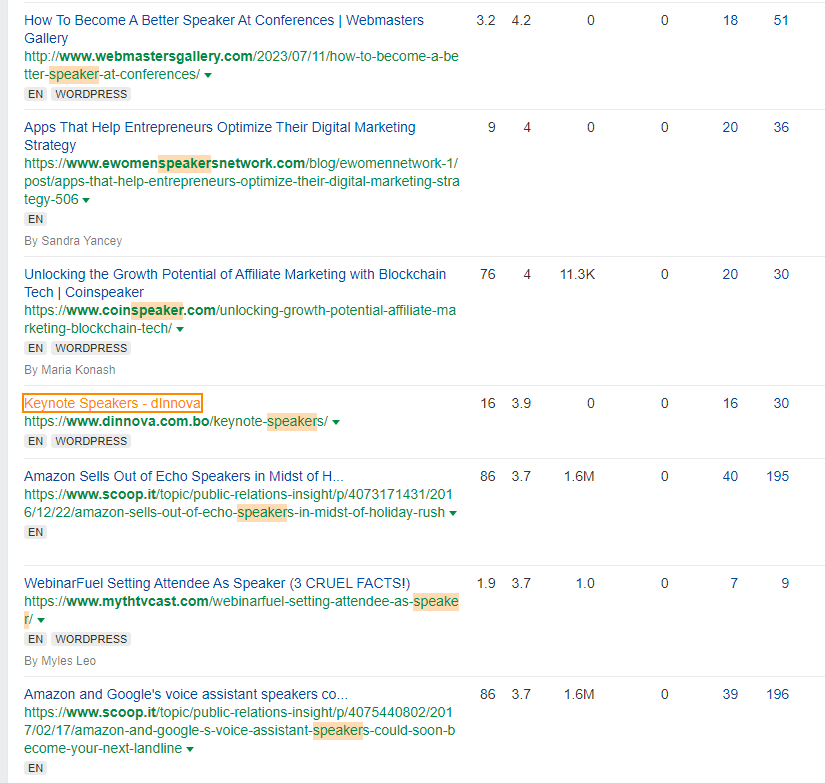
Make your participation count
Even if the event doesn’t offer backlinks to speakers, judges, panelists, or exhibitors, you can still turn your participation into links, increase your business visibility, and build your personal brand.
Here are a few tactics to try:
- Repurpose your presentation: Write a blog post, design infographics, and create short videos summarizing key insights from your talk.
- Leverage social media: Share the content on social media and live-tweet using the official hashtags.
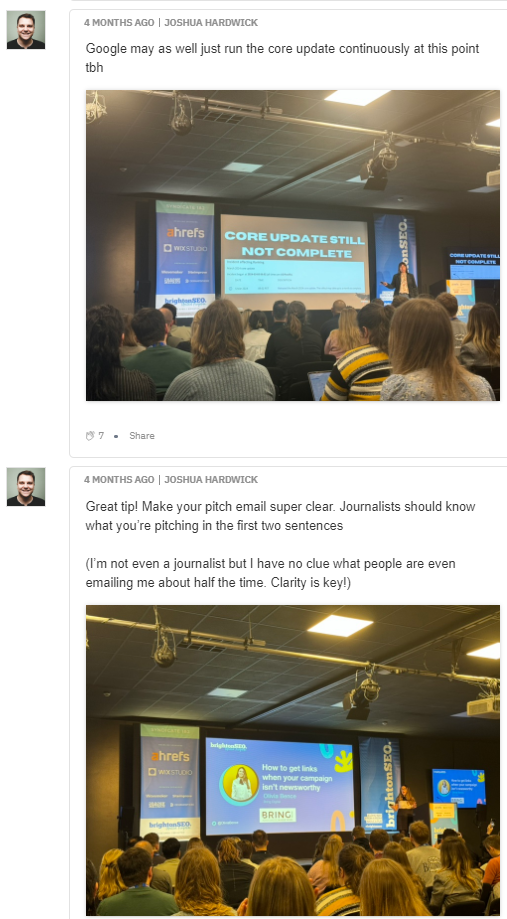
- Engage with attendees and speakers: Build relationships that could result in natural link opportunities, like link exchanges.
Final Thoughts
Hosting, sponsoring, or participating in events could get you high-quality links and improve your domain authority and search rankings.
However, if you’re doing it just for links, your ROI won’t be high.
Because the main benefit isn’t the link juice but the exposure that you get and the business opportunities that follow. These usually outstrip the SEO gains.
That’s why events should be seen not as link-building initiatives, not even SEO ones, but marketing ones, and the links that you get are just a nice side.
Having said that, you can do many things to maximize link-building opportunities at events.
If you’d like help with that, get in touch with the Editorial.Link team for a free chat.








